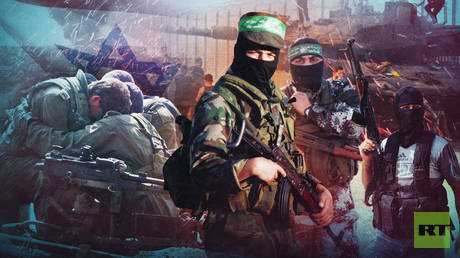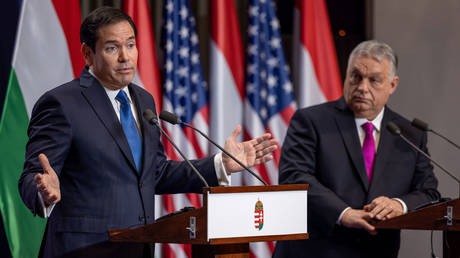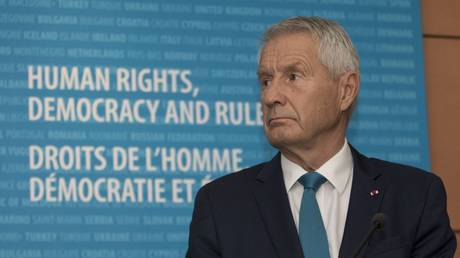
West Jerusalem claims it’s close to defeating Gaza’s militants but the facts show otherwise
Through April, the IDF had targeted more than 32,000 military sites belonging to Hamas and its allies. In June, Israel announced that 15,000 of the group’s militants had been eliminated. But experts are certain those measures won’t eradicate the Islamic group that has been in charge of Gaza since 2007.
“We are advancing to the end of the stage of eliminating the Hamas terrorist army,” Prime Minister Benjamin Netanyahu said on Monday, addressing the cadets of Israel National Defense College.
“I was very impressed by the achievements above ground and below ground, and by the commanders’ fighting spirit. With this spirit we will achieve our objectives: Returning our hostages, eliminating Hamas’ military and governing capabilities, ensuring that Gaza will not constitute a threat…” he added.
Since October 7, 2023 – when hordes of Hamas militants attacked Israel and killed more than 1,500 people – Israel has eliminated dozens of Hamas tunnels. It has seized weapons depots and cash, destroyed various military sites, killed operatives of Hamas and of the Palestinian Islamic Jihad and captured thousands others.
Victory Is Still Remote?
But almost nine months in, Israel’s victory over Hamas still seems remote.
Before the deadly October 7 attack, the Islamic group that has been in control of the Strip since 2007, boasted five brigades or 25 battalions with a total number of active combatants standing at 30,000.
In June, Israel admitted that it had only eliminated half of that original force, or 15,000 Hamas combatants. On Tuesday evening, the country’s chief of staff, Herzi Halevi, said Israeli forces had killed at least 900 militants in Rafah, south of the Strip.
Reports suggest that Hamas is now actively recruiting new cadets, many of whom are 18 year-olds, to replenish its ranks, but even if they fail to reach their initial numbers, the existing battalions are more than enough to challenge Israel.
Just on Monday, Hamas militants fired twenty rockets from Khan Yunis at Israel’s southern communities, showing they are still capable of putting up a fight. Areas that had been vacant of Hamas before are now seeing a resurgence. Israeli soldiers continue to fall in the Strip, almost on a daily basis, with the total number already exceeding 670.
“I don’t believe Israel can destroy Hamas completely,” said Shadi Abdelrahman, a political analyst and native of Gaza who left the Strip shortly before the war.
“Hamas is not like any other group. They are not outsiders. They have an ideology connected to a cause, and that cause is to fight for their lands or to avenge the death of their loves ones,” he added.
Stemming from the Muslim Brotherhood, a radical Islamist organization that’s deemed terrorist by many regional and international players, Hamas was established in Gaza in late 1980s as a response to what they call Israeli occupation and the inability of other Palestinian factions, including Fatah, to confront it. But they were far more than just a group that wanted to resist Israel militarily. Just like their patrons, the Muslim Brotherhood, they were a social movement: they established schools and hospitals, they ran charities and served as mediators in family feuds, and that made them an indispensable part of the Gazan society.
“Socially speaking, Hamas of today doesn’t have that much power and cannot provide what it used to before, simply because they cannot move freely due to Israel’s heavy shelling,” explained Abdelrahman.
“Militarily, their capabilities have also been damaged. The stocks of their weapons have been depleting, many tunnels have been destroyed, infrastructure has been devastated. Their combatants must be exhausted as they have been fighting for a long time. But from the political point of view, Hamas has never been stronger,” added the analyst.
According to a recent poll, conducted by the Palestinian Center for Policy and Survey Research, 67% of Palestinians – both in the West Bank and Gaza – believe that Hamas was right in launching the deadly October attack, while 61% said they would want to see Hamas, not any other group, control the Strip after the war.
Holding on to power
Hamas is already taking steps in that direction. Leading fierce negotiations with Israel through Egyptian and Qatari mediators, Hamas says loud and clear that it has no intention to relinquish its power when the war is over. Israel insists it will only stop the current confrontation if Hamas is out of the picture. But an Egyptian official involved in the talks between Israel and the Islamic group, who agreed to speak on condition of anonymity, said the Jewish state will not have any other choice but to let Hamas play a role in the governing force of the enclave when the conflict ends.
“Israel doesn’t want to see Hamas going back to power but, whether they like it or not, Hamas will play a role in the future government of the Strip, probably together with the Palestinian Authority.”
Officials in Jerusalem, however, seem to have other plans. Reports suggest that Israel is mulling assuming military control over the enclave that would gradually be replaced by the rule of moderate Arab states. Once things stabilize, Israel would then hand over the keys to the Palestinians, but this would be new players, neither Hamas, nor the Palestinian Authority, whom Israel has been accusing of supporting and funding terror.
Mistakes of the past
However, Miriam Wardak, a former aide to Afghanistan’s national security advisor, says the actions of Israel remind her of the behavior of the US two decades ago.
In 2001, after the deadly 9/11 attacks, the US invaded Afghanistan in a bid to collapse the rule of the Taliban, a radical Islamist organization. In addition to intense military pressure, the US and its allies also tried to bolster secular local governance, but two decades and $2.3 billion later, Washington failed to achieve its goal. In August 2021, the Taliban seized power again, and US forces had no choice but to pull out.
Looking back at the events that led to that fiasco, Wardak says Washington and its allies “struggled to establish strong, sustainable local governance and security forces,” a circumstance that led to widespread corruption and inefficiency within the Afghan government. They also failed to drain the support of external actors, to tackle the Taliban’s ability to exploit local grievances, and they couldn’t cope with the group’s guerrilla tactics that undermined US and Afghan forces.
Now, the former aide says, Israel seems to be repeating these mistakes.
“To start off, Israel – just like the US – might be underestimating its rival’s ability to adapt, survive and maintain support despite intense military pressure. Secondly, Israel may not be sufficiently addressing the external support Hamas receives from regional actors. Thirdly, Israel’s heavy military operations that cause significant civilian casualties only increase local and international opposition, and what’s worse they also lead to further radicalization,” she argued.
Wardak is certain that destroying Hamas will be a tough nut to crack. Drawing lessons from the American experience in Afghanistan, she believes military pressure cannot be the only answer.
“To effectively address the threat posed by Hamas, Israel should consider a multifaceted approach. To begin with, it needs to improve the living conditions in Gaza. It should support the development of legitimate and effective Palestinian governance structures that can counterbalance Hamas’s influence.”
“Furthermore, Israel should work closely with international partners to apply diplomatic and economic pressure on Hamas while avoiding actions that alienate the broader Palestinian population. Conducting precise, intelligence-driven operations to weaken Hamas’s military capabilities while minimizing civilian casualties is essential. Finally, exploring opportunities for indirect dialogue and conflict resolution mechanisms could help reduce hostilities and create conditions for a long-term political solution,” she summed up.




